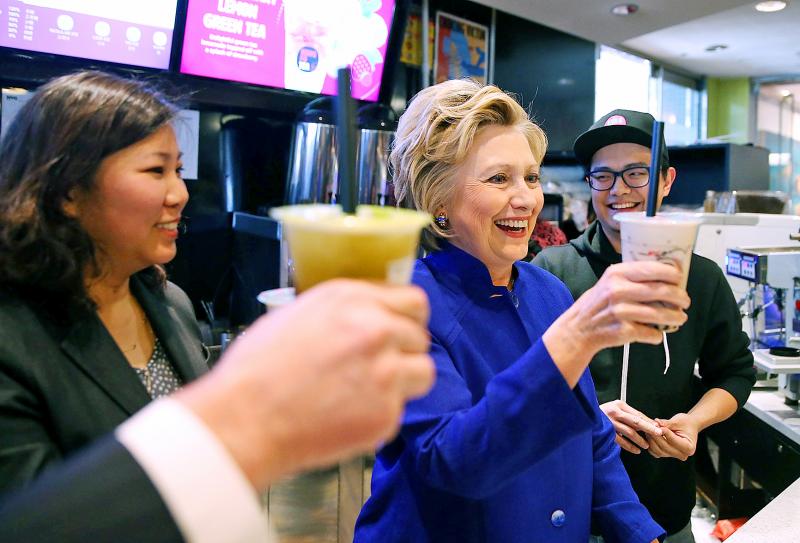The US for the first time became Taiwan’s largest market for exports of agricultural products, with outbound shipments in the first quarter surging 33.3 percent to US$23.2 million from a year earlier, the Council of Agriculture (COA) said yesterday.
The council’s latest report showed that the top five importers of Taiwanese agricultural produce, totaling 450,000 tonnes, in the first three months of this year were, in descending order, the US, Japan, China, Hong Kong and Vietnam.
China was the largest importer of Taiwanese produce from 2013 to last year. However, its share of Taiwanese agricultural exports fell to 14.4 percent in the first quarter of this year from 21.1 percent a year earlier.

Photo: AFP
While first-quarter exports of agricultural produce in volume terms dropped 11.6 percent from a year earlier, total export value, adjusted for inflation, was similar to the same period last year, the council said.
First-quarter exports to the US jumped 48.7 percent to 75,742 tonnes from a year earlier, council data showed.
In particular, exports to the US of soybeans, mushrooms, fresh and refrigerated produce, honey, Oncidium flexuosum orchids, moth orchids, sea bass and mackerel all posted significant growth, the council said.
Outbound shipments of agricultural products used in the hand-shaken beverage industry, such as tea leaves, tapioca flour, and pineapple and mango juices also saw sharp growth, it said.
Exports of pineapple juice jumped 440.5 percent to 72 tonnes, while exports of mango juice surged 191.6 percent to 280 tonnes, it added.
Meanwhile, exports to Japan rose 16.6 percent to US$2.07 million in the first three months of this year, council data showed.
The council expects agricultural exports in the first half of the year to follow the trend in the first quarter, COA International Division Director Lin Chia-jung (林家榮) said, as the COVID-19 pandemic continues to affect logistics and transportation.
An upcoming trade initiative meeting with the US should further flesh out bilateral trade regulations, such as establishing a science and risk-based standard, and benefit bilateral agricultural trade, he added.
Lin was referring to the talks on the Taiwan-US Initiative on 21st Century Trade, set to be held in Washington at the end of this month.

The Central Election Commission has amended election and recall regulations to require elected office candidates to provide proof that they have no Chinese citizenship, a Cabinet report said. The commission on Oct. 29 last year revised the Measures for the Permission of Family-based Residence, Long-term Residence and Settlement of People from the Mainland Area in the Taiwan Area (大陸地區人民在台灣地區依親居留長期居留或定居許可辦法), the Executive Yuan said in a report it submitted to the legislature for review. The revision requires Chinese citizens applying for permanent residency to submit notarial documents showing that they have lost their Chinese household record and have renounced — or have never

A magnitude 5.6 earthquake struck off the coast of Yilan County at 12:37pm today, with clear shaking felt across much of northern Taiwan. There were no immediate reports of damage. The epicenter of the quake was 16.9km east-southeast of Yilan County Hall offshore at a depth of 66.8km, Central Weather Administration (CWA) data showed. The maximum intensity registered at a 4 in Yilan County’s Nanao Township (南澳) on Taiwan’s seven-tier scale. Other parts of Yilan, as well as certain areas of Hualien County, Taipei, New Taipei City, Taoyuan, Hsinchu County, Taichung and Miaoli County, recorded intensities of 3. Residents of Yilan County and Taipei received

Taiwan has secured another breakthrough in fruit exports, with jujubes, dragon fruit and lychees approved for shipment to the EU, the Ministry of Agriculture said yesterday. The Animal and Plant Health Inspection Agency on Thursday received formal notification of the approval from the EU, the ministry said, adding that the decision was expected to expand Taiwanese fruit producers’ access to high-end European markets. Taiwan exported 126 tonnes of lychees last year, valued at US$1.48 million, with Japan accounting for 102 tonnes. Other export destinations included New Zealand, Hong Kong, the US and Australia, ministry data showed. Jujube exports totaled 103 tonnes, valued at

BIG SPENDERS: Foreign investors bought the most Taiwan equities since 2005, signaling confidence that an AI boom would continue to benefit chipmakers Taiwan Semiconductor Manufacturing Co’s (TSMC, 台積電) market capitalization swelled to US$2 trillion for the first time following a 4.25 percent rally in its American depositary receipts (ADR) overnight, putting the world’s biggest contract chipmaker sixth on the list of the world’s biggest companies by market capitalization, just behind Amazon.com Inc. The site CompaniesMarketcap.com ranked TSMC ahead of Saudi Aramco and Meta Platforms Inc. The Taiwanese company’s ADRs on Tuesday surged to US$385.75 on the New York Stock Exchange, as strong demand for artificial intelligence (AI) applications led to chip supply constraints and boost revenue growth to record-breaking levels. Each TSMC ADR represents